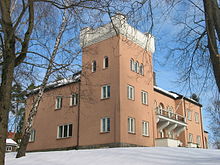- Nansen Institute
-
The Fridtjof Nansen Institute is named after the Norwegian polar explorer Fridtjof Nansen (1861-1930). It is housed in Polhøgda, Nansen's mansion from 1901 to 1930.
The institute is an independent research foundation with a multi-disciplinary approach, engaged in research on international environmental, energy, and resource management politics. The main disciplines are political science and international law, but also geographers, historicists, economists, and anthropologists are part of the staff [1]. The research centers around six focal points[2]:
- Global governance and sustainable development
- Marine affairs and law of the sea
- Biodiversity and biosafety
- Polar and Russian politics
- European energy and environmental politics
- Chinese energy and environmental politics
The Fridtjof Nansen Institute groups as one of Norway's foreign politics research institutes.The creation of the research institute
Fridtjof Nansen was a famous Norwegian polar explorer, scientist, diplomat, humanist, and Nobel Peace Prize laureate. Nansen lived at Polhøgda from its completion in 1901 until his death in 1930. His grave is in the garden in front of the manor. After his death the Nansen the property was donated to "interests that is close to Nansens life and doing"[3]. Scientific research was a natural choice. However there was to be some time before the foundation Polhøgda was to be realized. In 1948 formal statutes where adopted. In 1983 the name Fridtjof Nansen Institute was first used.
References
External links
Categories:- Norwegian organisation stubs
- Research institutes in Norway
- Multidisciplinary research institutes
- Bærum
Wikimedia Foundation. 2010.

